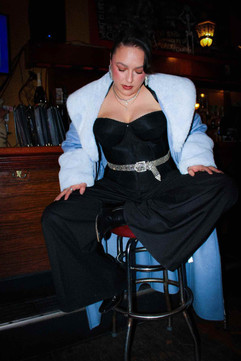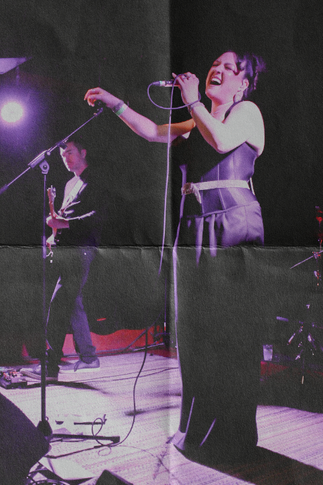Raquel Rodriguez: The Housewife Tour / Boston, MA
- starwave magazine
- Apr 15, 2025
- 7 min read
Updated: Jul 12, 2025

The rush and thrill of opening night for the Housewife tour was evident as LA Native Raquel Rodriguez shuffled into the Middle East Nightclub on Tuesday night, February 25th. Taking on the Boston cold in true LA Fashion with a floor-length blue fur-trimmed coat ready to stun her crowd. Rows of people eager to groove and jive on the dance floor to the sounds of Raquel's smooth vocals filled the room with roars as she stepped on stage. Raquel brought the LA warmth and spirit to Cambridge, MA, with performances of hits from her latest album, Housewife, and her debut album, Sweet Side. The magnetic energy radiated through the crowd during a performance of Last Night, with people forming a dance circle and letting the rhythm move through them. Raquel transformed the Middle East Nightclub and gave her fans a much-needed night to dance away their troubles. Throughout the performance, Raquel gave insight into the driving forces behind her music and how she blends her passion for music with cooking. She even explains the parallels between being a housewife and an independent artist she discovered while making the record. Once Raquel sang her last song and strutted off the stage for the night, the crowd flocked to the merch table to meet her. Leaving with signed vinyl records and hearts filled with music, Raquel enchanted devoted and new fans alike.
After the show, I sent Raquel a few interview questions that asked her to give us a deeper look into some of the narratives she was giving fans on stage:
J: Your marketing for Housewife blends your passion for cooking with your album to emphasize the "housewife" motif. Truly perfected recipes must undergo countless revisions and rewrites before a chef would deem them worthy of sharing. What would you say your musical recipe revision process is like?
R: This is one of the biggest parallels between cooking and music—both are deeply personal art forms. While I wouldn't call myself a chef, I can relate to the way chefs refine a recipe before deeming it worthy of sharing. The same goes for making a song or album.
For me, the process starts with finding a beat that sparks inspiration. I like to have a musical foundation to guide the lyrics and theme. From there, I start writing—sometimes alone, sometimes with a songwriter like Jess Best—while the producers develop the track further. I like to have the lyrics as solid as possible before recording so I know how the song will flow, and I use studio time to do more vocal production than writing.
Recording follows a similar trial-and-error process. We experiment, keep what works, and cut what doesn't. This is also where we refine the details—background vocals, auxiliary instruments, and structural choices like intros, interludes, or outros. It's a stage where we have the freedom to try things and see what sticks. Once the song feels right, it moves into mixing and mastering. That's more Sam's domain, but we fine-tune every detail, listening on studio monitors, kitchen speakers, and—most importantly—car speakers. If something needs tweaking, we revise and repeat until everything sounds just right.
J: "Artists are the gatekeepers of truth. We are civilization's radical voice." — Paul Robeson. As an artist, what truth are you using your radical voice to share?
R: As an artist, the truth I'm sharing is that fulfillment and success aren't defined by traditional expectations. The concept behind Housewife challenges outdated stereotypes of womanhood and draws parallels between the overlooked labor of housewives and independent artists. There's so much effort that goes into what we do, and just because it doesn't fit the usual definition of success doesn't mean it's not valuable.
My "radical voice" comes through in the way I embrace authenticity—through my music, my journey as an independent artist, and even my love for cooking. I want people to know they don't have to follow a predetermined path to find meaning in what they do. Whether you're an artist, a housewife, or something in between, your work is valuable simply because it's yours.
J: During the show, you told a story about how conversations inspired both of your album titles with your brothers. Can you tell me more about the conversations with your brothers that led you to Sweet Side and Housewife? Could you describe the impact those conversations had on your career trajectory?
R: I won't get into the exact details of the conversations because they're a little too personal, but I will say that both Sweet Side and Housewife were inspired by conversations with my brothers that made me question how I define success and how others perceive my personal and professional choices. These moments forced me to reflect on what it really means to carve out my own path and how the expectations of others can often clash with what feels right to me.
With Sweet Side, the conversation with my oldest brother revealed a disconnect between how I wanted to be seen and how he saw me. I know he's always had my back as my older brother and genuinely only wants the best for me. I also know that he has one of the best smiles I've ever seen, but I don't get to see it often. If only he could show that side more instead of the doubt, we'd get along much better. Especially in Mexican culture, expressing vulnerability or concern can sometimes come across as harsh or mean; it wasn't a communication skill we were taught well. I realized how deeply I internalized that tension, and it made me want to embrace the parts of myself that felt free, fun, and authentic. The song "Sweet Side" became my way of saying that, even if the world around me didn't understand, I am enough just as I am.
A few years later, a similar conversation with my other brother about my career made me feel undervalued and overlooked. Again, his intentions were genuine, and he truly wanted what was best for me, but I felt like he didn't trust my vision for myself and wanted to guide me in a direction he thought was better. He questioned my choice of music, even suggesting I should switch to country because it's what he believed people wanted to hear from me and would make me "more successful." I pushed back, and it turned into an ugly argument. That conversation planted a seed of frustration for a long time. It also felt like he judged me for "giving up" because my life, in some ways, resembled that of a housewife—he saw me balancing my personal life and career as if I wasn't working hard enough or prioritizing my own dreams. To him, if I wasn't constantly hustling in a way he understood, then I wasn't doing enough for my career. I realized that no matter how much I worked, I was still being measured by other people's standards of success. Housewife became a response to that—about owning my narrative and showing that success isn't defined by someone else's expectations. The lyrics are my declaration that I don't need anyone to rescue me or define my worth. I've found my own value, and it's something that's mine, no matter who approves of it.
Both of these experiences fueled my need to share my truth and pushed me to be even more confident in the voice I've worked so hard to cultivate as an artist. These conversations forced me to confront the pressures and stereotypes I've faced and transformed that frustration into motivation. Now, when I write and perform, it's for me. I've learned to navigate the complexities of who I am—the love and misunderstandings that come with it—and, ultimately, the power I've found in staying true to my own path.
J: Can you tell me about the parallel you found between housewives and independent artists and expand on your own experience within that parallel?
R: When I started thinking about the parallel between housewives and independent artists, I was struck by how much both groups do to keep things running, often behind the scenes, without much or any acknowledgment. Housewives take care of the family, the home, the meals, the emotional labor—basically, the foundation of a family's well-being and success. They're the ones making sure that everything is in place, yet their contributions are frequently minimized or ignored.
Independent artists are in a similar position. We wear multiple hats—songwriters, producers, performers, promoters—and we do it all with very little outside help. We are the ones putting in the real work, often on our own dime, to make art that is relatable, emotional, and accessible. We spend countless hours in the studio, working with collaborators, rehearsing for shows, and booking gigs to make sure the world gets to hear what we have to say. We often perform in smaller rooms for smaller crowds, but it's those intimate settings that allow us to connect on a deeper level with people who find meaning in our work. And let's not forget that independent artists are the backbone of the live music scene. Without us, the music world would be monotonous, unaffordable, repetitive, and stagnant—there would be no fresh voices, no new ideas, no evolution of any genre.
Yet, despite all of this, both housewives and independent artists are constantly undervalued, overlooked, and unappreciated. We put so much of ourselves into what we do, but society tends only to value what's flashy or widely recognized. For housewives, it's often seen as "just" their role to take care of everything, as if the love, care, and hard work put into a home aren't worth as much as a traditional career. For independent artists, the hours we put in creating, performing, and building our careers don't always translate to the validation or success that we deserve because it's often minimized to "well, at least you don't have to get a real job, and you're having fun" as if the work we do isn't a real and grueling job. We're often expected to do it all for the passion of it as if that somehow makes the hard work less valid and more financially accessible. I mean, shit, we have rent due too!
Both groups know the value they bring, even when the world doesn't always see it. That's part of what Housewife is about—to reclaim that value and recognize the power in doing the work that isn't always visible to everyone else. It's about saying, "I'm here, I'm working, and my worth is not defined by anyone else's perception of success."
J: You just kicked off your Housewife tour here in Boston— 10 American stops and 10 European stops. Is this your first time going on a European tour? What are your top 3 goals/hopes for this tour?
R: This isn't my first time going to Europe—it'll be my third or fourth trip at this point! My last tour in June 2024 had a few sold-out shows in Amsterdam and London, which was incredible. As for this tour, some of my biggest goals are to stay healthy, stay present, and continue being kind, both to myself and everyone around me. It's such an exciting journey, and I want to make sure I'm giving my best to every city and enjoying the ride along the way.
Photos, Interview, and Review by Juliana Nicholls









































